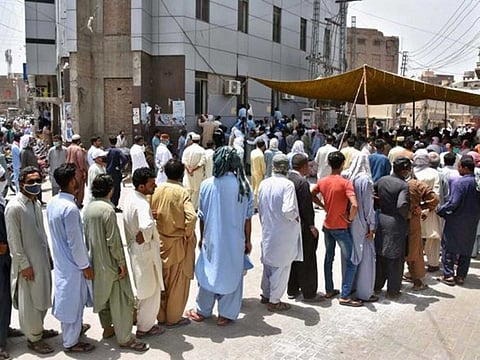COVID-19: More than 18 million Pakistanis to lose jobs due to lockdown, says minister
Around 70 million of the country's population may fall below the poverty line

Dubai: More than 18 million Pakistanis have become jobless due to the lockdown imposed in the country to prevent the spread of the new coronavirus, COVID-19, said Asad Umar, Minister for Planning, Development and Reforms.
“According to [the] calculations of Pakistan Institute of Development Economics (PIDE), around 70 million of the country's [population] could fall below the poverty line in the current perspective,” Asad Umar said in a televised press briefing in Islamabad. Also, he feared that due to the lockdown, more than one million small businesses could be shuttered forever.
Umar, who also chairs the National Command and Operation Centre on coronavirus, said keeping in view the growing number of deaths in the country, people should adopt strict protective measures against COVID-19.
526 COVID-19 deaths
According to the official tally, the number of confirmed coronavirus cases has risen to 22,550 patients as of Wednesday, May 6, with 526 deaths, and 6,217 patients have recovered. “The average numbers and rate of infections are still far less when compared to the European countries and the United States,” said the minister.
International comparison
He pointed out that in Pakistan, the disease had not proved to be as widespread as in Europe and the US. Comparing the death rate of various countries in 46 days after 100 deaths, the minister said in Spain 414 people out of one million died while in Italy the number was 405; it was 256 in France, 248 in UK and 116 in US while in Pakistan only two corona patients died out of one million.
On average, he said as compared to Pakistan, the US had 58 per cent more deaths, UK had 124 per cent more deaths while Spain had 207 per cent more deaths.
Umar said there could be certain reasons behind low death rate in this region, adding that no one could claim to have completely eradicated the infection.
He said every country was trying to flatten the curve to control the disease to a certain level. The minister said that the NCOC would share all these analyses about coronavirus in the meeting of National Coordination Committee (NCC), to be chaired by Prime Minister Imran Khan.
“We do not follow the West blindly and the future decisions would also be taken according to our own ground realities,” he remarked.
Burden on healthcare system
About the question why the government was not opening up everything if it thought that the disease was not so dangerous, the minister said: “We are not opening up everything because we do not want to put burden on health system”.
The NCC meeting, he said would be held before May 9 — the last day of lockdown, where the decision about extending it would be taken keeping in view the information presented by NCOC.
We do not follow the West blindly and the future decisions would also be taken according to our own ground realities.

The minister said the government was facing huge economic losses due to the lockdown; in April, it faced a loss of Rs119 billion (Dh2.7 billion).
“We have to run the course of government, health, education and other systems and also to provide relief to the poor with the help of this tax money,” he added.
Reduce food intake
Referring to a survey conducted by GALLUP Pakistan, he said every one person out of four said that they had had to reduce the quantity of their daily food intake.
With respect to the current situation of the healthcare system, the minister said that at present there were 5,000 Intensive Care Units (ICU) available in the country, of which 1,500 had been readied for corona patients while only 132 patients had been admitted to the ICU.
Similarly, he said the country had 1,400 ventilators and by June this year, the number would rise to 2,000. He said that at present 35 corona patients were on ventilators.
Increasing capacity
The minister said the government was also increasing capacity of health sector, adding that today’s healthcare system of the country was far better than that in pre-COVID days. He said currently the country had a capacity of 20,000 testes per day; however, the number of tests being conducted were low in number due to some technical reasons.
The minister said Tracking, Testing and Quadrating (TTQ) strategy and mechanism was in place and its model was seen in ICT where two sectors were on lockdown and gradually the lockdown had reduced to 2-3 streets.
He said Europe has thousands of deaths and most places have above 20,000 deaths but they were also relaxing lockdown to run their economies.
“The target is to prevent [the] healthcare system from getting choked besides reducing hunger, poverty [and] unemployment due to COVID-19”, he added.
Sign up for the Daily Briefing
Get the latest news and updates straight to your inbox







